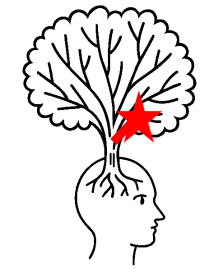Very strong first-degree thinking

Very strong first-degree thinking
To relativize events, you need context. Those who lack that ability often get stuck in their first thought or conviction. We call that very strong first-degree thinking.
It's a continuum: from rigid convictions, to obsessive thoughts, to psychotic experiences, and ultimately schizophrenia.
Rigidity and fixed beliefs
At a very strong first-degree thinking, the first interpretation is repeatedly confirmed. Examples:
- Someone who learned in his youth that “women cannot be trusted” later sees every problem in relationships as proof of that idea.
- In extreme form, this leads to movements like the incels: men who reinterpret disappointments in relationships as proof that all women are bad or manipulative.
- Religious beliefs can also become rigid in this way: “we have the truth, the rest of the world does not.” Every conflict with non-believers thus becomes a confirmation of being right.
From rigidity to obsessive thoughts
If rigidity gets stronger, obsessive thoughts arise. Examples:
- Being convinced that you would incite someone to stick their fingers into a power outlet during a youth weekend, which makes you not dare to go at all anymore.
- Being convinced that a colleague is committing fraud; every small detail seems to confirm that suspicion.
- Being convinced that your partner is cheating.
- Being convinced that you have a serious illness (hypochondria).
- Being convinced that you are too heavy, which can lead to anorexia.
- Mysophobia and obsessive compulsive disorder (OCD).
To Psychosis and Schizophrenia
When the compulsion gets too strong, reality itself can begin to distort.
- Senses are largely context-dependent. When that system is disrupted, sounds, images or smells can be misinterpreted.
- In the beginning, one sometimes still realizes that this is not real.
- Gradually, that distinction blurs.
- When the distortion becomes permanent, we speak of schizophrenia.
Summary
Very strong first-degree thinking can therefore lead to a sliding scale: from rigid convictions → to obsessive thoughts → to psychosis → and ultimately schizophrenia.
The common factor is the lack of context sensitivity, which causes someone to get stuck further and further in a one-sided interpretation of reality.